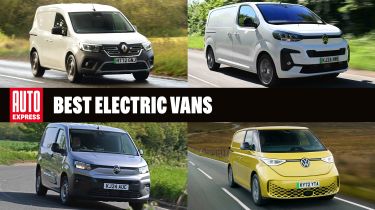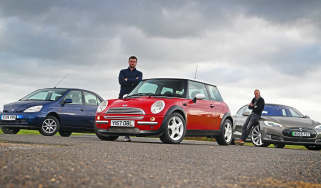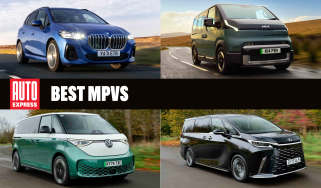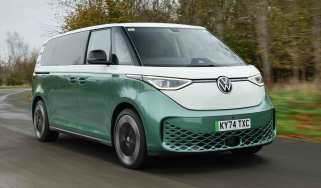Best electric vans 2026
We reveal the best electric vans to buy or lease in the UK right now
It isn’t only cars that are making the switch to electric power. The electric van market is rapidly expanding, too. The best electric vans still offer plenty of payload and carrying capacity, and you’ll also benefit from the financial and environmental benefits of driving an EV.
Many van operators will harbour serious doubts about the practicalities of running an electric van. It’s certainly a big change and it will not suit everyone but if you have easy access to overnight charging and rarely cover more than 200 miles in a day, an EV van can bring major advantages in terms of running costs and the driving experience.
Our expert road testers have tested every electric van that you can buy in the UK, and you’ll find the very best options listed below.
If you’re interested in buying an electric van, remember that Auto Express can help. Our Find a Car service will help you find a great deal on a used van as well…
Top 10 best electric vans
1. Renault Master E-Tech
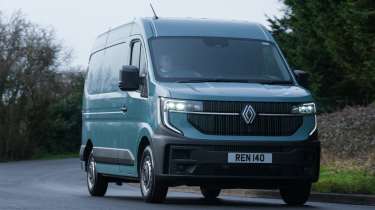
- Prices from £47,100 (exc. VAT, after PiVG)
- Van size: large
- Maximum WLTP combined battery range: 285 miles
- Maximum payload: 1,125kg
- Maximum load volume: 14.8 cubic metres
The latest Renault Master E-Tech is a much more convincing electric van than the one it replaced. While the older model only offered a miserly 115 miles of battery range at best, the new one can cover up to 285 miles between charges. Covering these miles shouldn’t prove too much of a chore, either, since the latest Master is pleasingly refined on the move.
It may be a large panel van, but the Master’s interior is a rather car-like affair. At the centre of the dashboard is a 10-inch touchscreen that operates Renault’s openR Link infotainment system (the same system used by several of the brand’s cars), and this is surrounded by a generous helping of standard kit, including air-conditioning, a digital driver’s display, automatic headlights and wipers and rear parking sensors. There’s 135 litres of handy storage space in the cab, too.
“I found no problem piloting the Master through narrow French streets. The steering is just as pleasant at faster speeds, with good accuracy that makes it easy to place in its lane along the motorway. ” - Dean Gibson, senior road test editor.
2. Ford E-Transit Courier
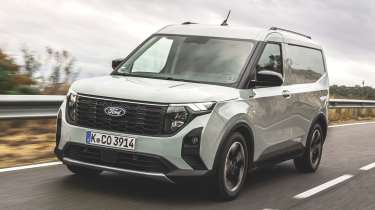
- Prices from £27,000 (exc. VAT, after PiVG)
- Van size: small
- Maximum WLTP combined battery range: 181 miles
- Maximum payload: 698kg
- Maximum load volume: 2.9 cubic metres
If you’re zipping around the city streets and stopping on a regular basis, having a diesel engine idling constantly isn’t exactly the most eco-friendly or cost effective way to do it. It’s tasks like this where the Ford E-Transit Courier thrives, as it’s compact enough for chucking into tight parking spaces.
As is often the case with Ford’s vans, the E-Transit Courier is actually reasonably engaging to drive. The instant acceleration of electric motors means you can quickly get up to speed, and there’s enough power on hand for motorway runs, although the wind noise will make itself known at these speeds.
“Since the Transit Courier is based on the Puma platform, it can lay claim to being one of the best-handling vans on the market, while the driving position and big windows give you a clear view of your surroundings.” - Sam Naylor, Auto Express contributor.
Ford E-Transit Courier reviewFord Transit Courier deals
3. Ford E-Transit Custom
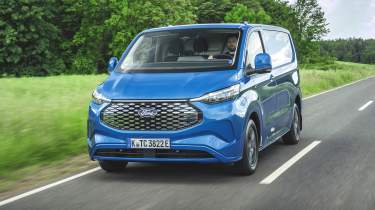
- Prices from £43,630 (exc. VAT, after PiVG)
- Van size: medium
- Maximum WLTP combined battery range: 204 miles
- Maximum payload: 1,088kg
- Maximum load volume: 6.8 cubic metres
The Ford Transit Custom is a huge seller, so it was inevitable that this medium panel van would make the transition to electric power. The Ford E-Transit Custom doesn’t really look any different from its diesel and plug-in hybrid powered counterparts, but this is deliberate. The E-Transit Custom is as car-like to drive as we’ve come to expect, offers plenty of kit and will happily take on a great deal of cargo.
This level of similarity is what Ford hopes will draw customers towards its fully electric medium van. The Custom’s 64kWh battery pack means longer motorway trips aren’t out of the question, either, as it returns up to 204 miles on the WLTP combined cycle. This is an important van for Ford, and it’s such an appealing machine that it’s previously bagged our Electric Van of the Year award.
“The Ford E-Transit Custom does an admirable job of remaining composed for its size, the extra ballast of the battery possibly helping here. Even at slower speeds, the ride remains mostly bounce and crash-free.” - Shane Wilkinson, senior content editor.
Ford E-Transit Custom reviewFord Transit Custom deals
4. Volkswagen ID.Buzz Cargo
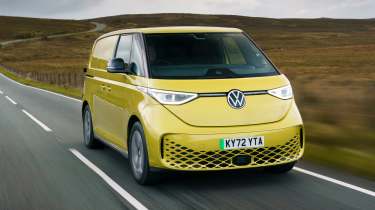
- Prices from £31,380 (exc. VAT, after PiVG)
- Van size: medium
- Maximum WLTP combined battery range: 276 miles
- Maximum payload: 712kg
- Maximum load volume: 3.9 cubic metres
Not only does the Volkswagen ID.Buzz Cargo offer the distinctive retro charm of the classic Type 2, but it also has plenty of cleverly packed space and up to 276 miles of claimed battery range at its disposal. VW’s groovy electric van shares the same MEB platform as the ID.3 hatchback, plus the ID.4 and ID.5 SUVs. This makes it car-like to drive, and the suspension does a good job at soaking up bumps and imperfections in the road.
Although it’s shorter than a Tesla Model Y, the Volkswagen ID.Buzz offers plenty of space on board thanks to some clever engineering, and its distinctive design will certainly help your business to stand out. Everything feels very well put together, too, which bodes well for the electric VW’s durability over the longer term.
“The ID. Buzz Cargo is very smooth for a van, which is another side effect of its car-derived platform. The suspension smothers bumps in the road very well, and this is a very relaxing place to spend time. There's no wind noise and road noise is also well suppressed, although bigger bumps can cause shudders to echo through the van's frame.” - Andy Goodwin, Auto Express contributor.
Volkswagen ID. Buzz Cargo reviewVolkswagen ID. Buzz deals
5. Ford E-Transit
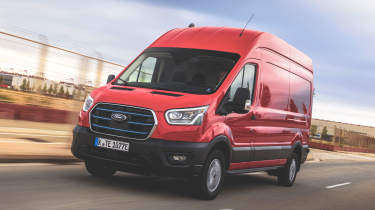
- Prices from £49,545 (exc. VAT, after PiVG)
- Van size: Large
- Maximum WLTP combined battery range: 249 miles
- Maximum payload: 1,745kg
- Maximum load volume: 15.1 cubic metres
The Ford E-Transit offers up to 249 miles of range and there’s no reduction in space compared to the diesel model. So, in other words, this is a great stepping stone into the world of zero-emission vans. The E-transit is good to drive and surprisingly quick off the line, too — especially if you opt for the larger 265bhp motor. Ford also offers several sizes and variants of the E-Transit, so there should be a version to suit your business’s specific needs.
Inside, the E-Transit’s cabin is a comfortable place to sit, with a tall driving position, large mirrors and plenty of cabin storage. Ford’s SYNC 4 12-inch touchscreen set-up is available as an option on entry-level models, along with adaptive cruise control, climate control and electronic driver aids.
“It feels quiet and refined, yet the rear-mounted electric motor has enough punch to make the E-Transit feel quick off the line. There’s plenty of power to cope with big payloads, too.” - Dean Gibson, senior content editor.
Ford E-Transit reviewFord Transit deals
6. Renault Kangoo E-Tech/Nissan Townstar EV/Mercedes eCitan
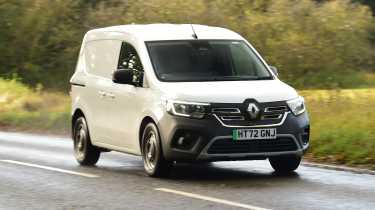
- Prices from £31,895 (Townstar EV, excl. VAT, after PiVG)
- Van size: small
- Maximum WLTP combined battery range: 186 miles
- Maximum payload: 975kg
- Maximum load volume: 4.2 cubic metres
When it was first launched, the original Renault Kangoo Z.E was one of the first mainstream electric vans to go on sale. Today, Renault has used its experience to create the Kangoo E-Tech, and this van shares its DNA with the Nissan Townstar EV and Mercedes eCitan. All of these vans offer sharp styling and a car-like driving experience, and with up to 186 miles of battery range on offer, occasional longer journeys won’t be a problem. If you know your Renaults, each van’s interior may look familiar as the switchgear and steering wheel are borrowed from the Renault Clio supermini.
As you’d probably expect, the Mercedes eCitan’s premium appeal comes with the highest starting price of the three. We’d only pick this model over the cheaper Nissan or Renault if you’re either hellbent on an upmarket badge or can find an excellent finance deal. Whichever model you choose, though, all three are very similarly equipped and capacious.
“Pull away, and a spaceship-style whirr warns pedestrians about the electric van's presence at low speeds (it deactivates at speeds over 20mph). From the lights, acceleration is quite sprightly, and it can be easy to break traction with the front wheels if you're not careful.” - Sam Naylor, Auto Express contributor.
7. Citroen e-Dispatch/Fiat e-Scudo/Peugeot e-Expert/Toyota Proace Electric/Vauxhall Vivaro Electric
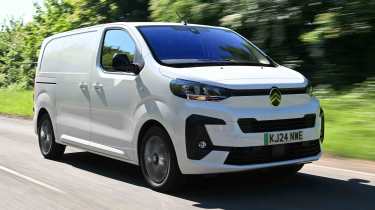
- Prices from £28,885 (e-Scudo, excl. VAT, after PiVG)
- Van size: medium
- Maximum WLTP combined battery range: 231 miles
- Maximum payload: 1,275kg
- Maximum load volume: 6.6 cubic metres
Stellantis isn’t afraid to share platforms, and the Vauxhall Vivaro Electric, Citroen e-Dispatch, Peugeot e-Expert and Fiat e-Scudo all share the same underpinnings and basic design. If that’s not enough choice for you, though, the Toyota Proace Electric is also a member of this family of medium-sized vans. Whichever badge you decide to go for (that choice will mostly boil down to brand loyalty and finance or leasing deals) these vans offer up to 6.6 cubic metres of load volume, while payload weights of up to 1,275kg aren't too far behind the diesel variants.
Do be aware, though, that carrying a full load will hamper the van's overall range. Inside, these vans are packed with safety and connectivity features from the Stellantis car range. There's full connectivity and smartphone access to assorted functions, too, while double cab variants are ideal for those who need to carry passengers as well as cargo. While these vans aren’t exactly full of driving thrills, they do remain very calm and stress-free on the move. We did find wind and tyre noise to be a bit irritating at motorway speeds, though.
“There’s light steering and a relatively tight turning circle, while the modest dimensions mean these vans are nearly as easy as a small van to manoeuvre in town. Rear parking sensors are a useful addition, though, to overcome the issue of the small door mirrors.” - Dean Gibson, senior road test editor.
8. Citroen e-Berlingo/Peugeot e-Partner/Toyota Proace City Electric/Fiat e-Doblo/Vauxhall Combo Electric
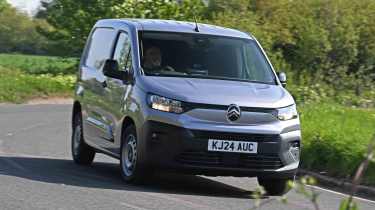
- Prices from £27,850 (e-Doblo, excl. VAT, after PiVG)
- Van size: small
- Maximum WLTP combined battery range: 220 miles
- Maximum payload: 781kg
- Maximum load volume: 4.4 cubic metres
Much like the Citroen e-Dispatch and its siblings, this group of small vans is another that benefits from Stellantis’s shared battery technology. The Citroen e-Berlingo, Peugeot e-Partner, Toyota Proace City Electric and Vauxhall Combo Electric all sit on the same underpinnings, and this results in a maximum WLTP combined range of 220 miles along with plenty of size and capacity options.
CCS fast-charging at a rate of up to 100kW should also prove useful to operators, meaning these vans can be topped-up to 80 per cent in around half an hour – ideal for getting it back on the road for a new shift. The Toyota has the edge over its Stellantis siblings when it comes to maintenance, though. Just like the brand’s passenger cars, this small electric van is also covered by the brand's 10-year service warranty, which is significantly longer than anything offered with the other versions.
“The Berlingo features a slightly different seat design when compared with its siblings, with denser foam and thicker side bolsters for greater comfort. That might be a reason to choose the Berlingo over its rivals if you spend most of your day in the driving seat.” - Dean Gibson, senior road test editor.
9. Fiat E-Ducato

- Prices from £45,880 (exc. VAT, after PiVG)
- Van size: large
- Maximum WLTP combined battery range: 263 miles
- Maximum payload: 2,400kg
- Maximum load volume: 17 cubic metres
The Fiat E-Ducato promises a wide variety of tailored options for electric van buyers. There are 3 lengths and 3 heights of panel van for a total of 28 body styles, as well as a chassis cab option and even a passenger version with up to 9 seats. Cargo volumes are hard to fault, while payloads go as high as 2,400kg, which is considerably higher than any of its rivals.
There's a choice of two batteries, either 47kWh or 79kWh, which offer up to 146 miles and 263 miles respectively. Fiat has also boosted the recharging rate for the E-Ducato with 150kW peak DC rapid charging. It’s a fully-fledged large panel van, but the big Fiat isn’t too intimidating from behind the wheel. There’s enough power for getting away from junctions and traffic quickly, while the lack of powertrain noise makes things much more relaxing than the equivalent diesel. The large door mirrors also help to prevent any mishaps resulting from this van’s sheer width (over two-metres).
“If you plan to drive in town then a reversing camera (an optional extra) is our recommendation, as it will help you keep an eye on the back bumper in crucial situations.” - Sam Naylor, Auto Express contributor.
10. Mercedes eSprinter
- Prices from £58,740 (exc. VAT, after PiVG)
- Van size: large
- Maximum WLTP combined battery range: 272 miles
- Maximum payload: 1,273kg
- Maximum load volume: 14 cubic metres
The Mercedes eSprinter is a large panel van with a premium badge and up to 272 miles of battery range, so it has plenty going for it. However, these qualities do come at a cost as you’ll be looking at nearly £60,000 even after the Plug-in Van Grant is applied. If you can afford it, though, the big Mercedes does feel a bit posher than at least some of its rivals.
Opt for the entry-level Pro trim and you’ll get Mercedes’ MBUX multimedia system as standard, along with a heated driver’s seat, Tempmatic air-conditioning and pre-entry climate control. There’s a plethora of safety and driver-assistance tech, too, such as active brake assist, hill-start assist, blind spot assist, crosswind assist, lane-keeping assist, and intelligent speed assist. Sadly, though, while it’s equipped like a Mercedes car, the eSprinter is far more susceptible to bumps in the road.
“Bumps and lumps send shudders through the body, and they seem louder than they do in the standard Sprinter, but that's because there's no diesel engine noise to compete with the sound. The lack of a gearbox makes life easy, though, so you can just concentrate on driving.” - Dean Gibson, senior road test editor.
How we choose the best electric vans
As is the case with any electric vehicle, battery range will be at the forefront of many electric van buyers’ minds. Naturally, any business needs their vans on the road in order to make money, so having to constantly stop and recharge is simply no good here. Thankfully, EV technology has already come a long way, so the best electric vans of all sizes offer plenty of range on the WLTP combined cycle.
There can be a big difference between a van’s range on paper and what it can achieve in the real world, so it’s the latter which our expert road testers pay close attention to by testing these vans on various types of roads while carrying varying payloads. The better a van’s real-world performance, the higher it’ll appear on this list. When the battery is finally out of juice, a quick charging time is crucial, too, so this also plays a role in determining each van’s final score.
As with any van, carrying capacity is another non-negotiable factor. In an ideal world, opting for an electric van over a diesel one wouldn’t mean a reduction in cargo space or payload capacity. In some instances, EVs actually offer the same capacities as their combustion counterparts, so this makes a particularly good impression with our team of van experts.
Nowadays it’s perfectly reasonable for a buyer to expect their new van to be comfortable, well-equipped and easy to drive so, once again, these are yet more important areas which we assess very thoroughly during our in-depth van testing. In fact, the very best performers are virtually car-like.
How you can choose the best electric van
While they can be a bit pricier to buy than their traditionally fuelled counterparts, most electric vans will actually save your business quite a bit of cash in the long run. If you’re able to charge at home or at your place of business, having the right electricity rate can mean a full top-up will cost far less than a full tank of diesel. You’ll also avoid emissions-based charges such as London’s Ultra Low Emission Zone (ULEZ).
As with any van, the first thing you’ll need to decide is which size you require. Electric vans come in a variety of shapes and sizes, so you’ll need to be sure just how much cargo space, payload capacity and towing capacity you’ll require. While the pitfalls of a van that’s too small are pretty obvious, operating one that’s unnecessarily large could cost you far more than is necessary, too.
If a particular van has caught your eye and appears to meet your business’s requirements on paper, we thoroughly recommend getting up close and personal with an example before you buy. Take a test drive and get a feel for the driving experience and on-board kit. If you’re covering particular long trips, you’ll want a van that’s comfortable and quiet. That being said, even shorter journeys can be far more pleasant in some vans than others.
That’s the van sorted, now take a look at the best electric cars…

